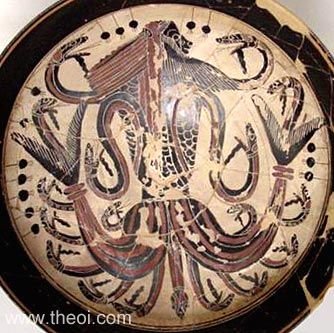Episode 21: Typhoios, Illuyankas and Hittites, Oh My!
In this episode, we explore the myth of Typhoios (Typhon) in its Greek context (1:58), followed by the somewhat analogous Hittite myth of Illuyanka ("Serpent") (7:14). To help us understand the Hittites better, we interview Prof. Gregory McMahon (UNH), a specialist. He first gives us the background on the Hittites and their writing system (13:56), followed by a closer look at the Illuyanka myths themselves (25:57).
The primeval mythical world was full of monstrous serpents: Typhoios is, of course, more than just a serpent, but he fits into a general category of monstrous serpent causing trouble for gods and humans alike. To give you a sense of how common serpents are in Greek myth, here is a quick inventory just off the top of my head:
Typhoios, who threatens Zeus and in some versions incapacitates him
The Giants, earthborn creatures who likewise try to overthrow the rule of the Olympian gods
The Python, killed by Apollo to set up his oracular seat in Delphi
The Hydra, the 9- (or 50-)headed serpent killed by Heracles; it had infested a spring in Lerna
The serpent guarding a spring in Thebes, killed by Cadmus when he was founding the city
The serpent guarding the Golden Fleece in Colchis
The serpents guarding the Apples of the Hesperides
The snaky sea monsters that threatened Andromeda (killed by Perseus) and Hesione (killed by Heracles)
Scylla, the serpentine threat to Odysseus on the high seas
Campe, the serpentine guardian of the doors to Tartaros.
The Typhoios story represents a really common motif: the establishment of order—by which we mean that secured by the Olympian gods—is threatened. In fact, the myths about Zeus’ ultimate succession to power are mostly about threats to his rule. Not only does he face the ubiquitous threat from his own children, which was central to the overthrow of his own father and grandfather, but also from creatures from the primeval world of earlier generations. Gaia, the Earth, is frequently involved, and to a large extent the emergence of the Greek Olympian gods came at the expense of her and her children (we’ll see this is also true when Apollo kills the Python and takes over the oracle at Delphi and displaces the original giver of oracles, Gaia herself). Typhoios is one of these children, and his serpentine nature (especially coils for legs) is connected to Gaia, whose offspring tended to be part serpent. The Giants, which feature centrally in the next episode, are her children and are serpents below the waist in many versions. Both Cecrops and Erichthonius, very early kings of Athens, were said to be born from the earth (the technical term is “autochthon,” emerging on one’s own from the earth) and had serpent’s coils for legs, at least in some versions.
At any rate, we promised some images of Typhoios, who, like other monsters, is depicted differently by different authors and artists. The first image is the really famous vase that shows Zeus confronting Typhoios and brandishing his thunderbolt:
You might compare another image of Typhoios, which is taken from the website Theoi.com and is said to be housed at the Metropolitan Museum of Art (though I’ve been unable to confirm with limited resources during Covid):
We have a special treat for this episode, a contribution by another fantastic student artist, Maggie Melendez. We’re so delighted to show her work here on our podcast webpage and feature it as our episode image!
The cosmically gargantuan Typhoios being thunderbolted by Zeus, by Maggie Melendez.
Credits
Written and Directed: R. Scott Smith
Special Guest: Gregory McMahon, Professor, Classics, Humanities and Italian Studies, University of New Hampshire
Voice Actors: A.J. O’Neil and Julia Sommer
Student Artist: Maggie Melendez
Music: Jared Sims (Brooklyn Tea)


